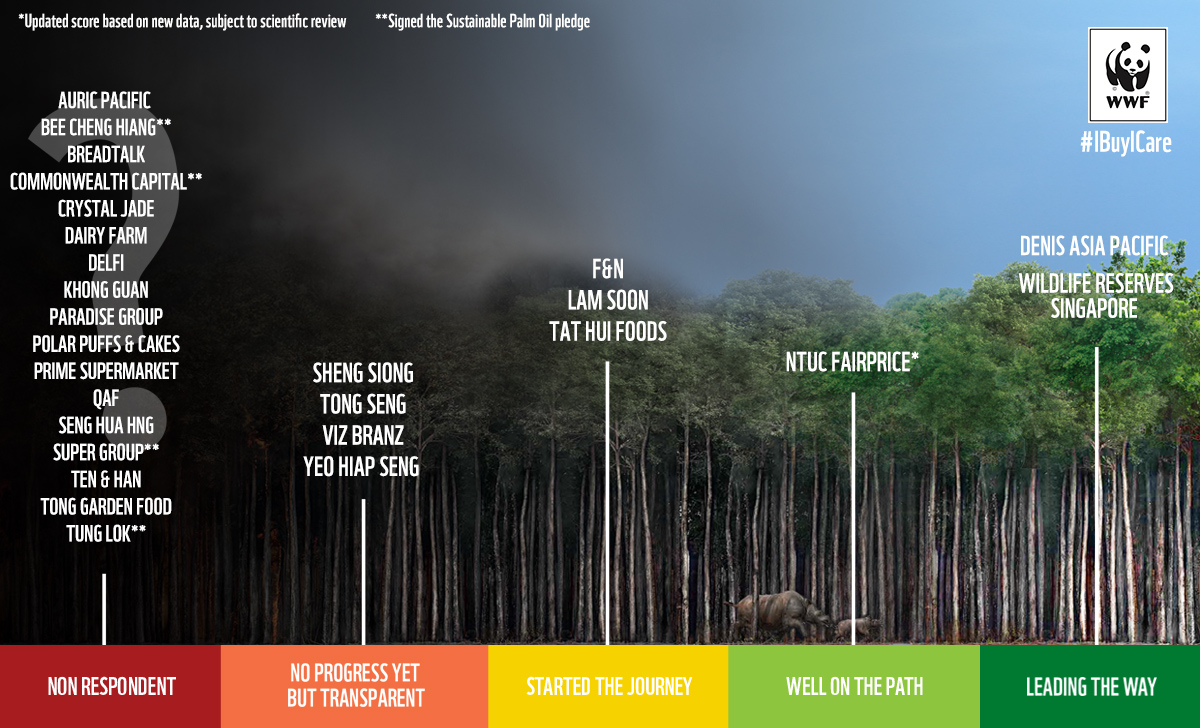Singapore, 21 September 2017 — Use of unsustainable palm oil remains prevalent among brands in Southeast Asia, and those in Singapore are no different, according to a new report by the World Wide Fund for Nature (WWF). In Singapore, two-thirds of home grown brands are not transparent about their palm oil usage, and a larger proportion (78%) does not source sustainable palm oil.
The Palm Oil Buyers’ Scorecard – Malaysia and Singapore 2017 is an initiative to introduce transparency into Southeast Asia’s palm oil industry. Published by WWF, the Scorecard assesses the buying and sourcing of palm oil by local retailers, manufacturers and food service brands.
According to the Scorecard, non-disclosure and lack of action was higher among brands in Singapore and Malaysia, compared to global brands. 30% of regional brands responded to WWF and only three have public commitments on palm oil use. In comparison, global brands had an 80% response rate and over 60% have palm oil commitments.
Elaine Tan, Chief Executive Officer of WWF-Singapore said, “Unsustainable practices in the palm oil industry are at the root of the transboundary haze and deforestation. Singapore is at the heart of a region that supplies 85% of the world’s palm oil. Our local brands need to show leadership by being accountable for their palm oil use and take real action to source sustainably.”
Brands cited internal factors such as capacity issues and higher costs as obstacles in the switch to sustainable palm oil. However, WWF highlighted that current industry rates for sustainable palm oil options start at less than 1 cent more per litre.
While consumer demand plays a key role in sustainability decisions by brands, there is a perceived lack of demand for sustainable palm oil by customers in Singapore.
New campaign to help brands understand consumer demand
In response to these findings, WWF-Singapore has launched a campaign to demonstrate to local brands that consumers care and support sustainable palm oil, by sending emails to brands via palmoil.sg. Through these emails, local CEOs are urged to take a pledge to be transparent with their palm oil use and start taking steps to source sustainable palm oil.
Elaine Tan added, “People want to know what goes into the products they buy and the real impact of it. Through this campaign, we hope to demonstrate to popular local brands that their customers want them to do their part in a preventable environmental problem that every person in Singapore experiences.”
Since the campaign launched, Bee Cheng Hiang, Commonwealth Capital and Tung Lok have made commitments to begin their journey on sustainable palm oil by signing WWF’s pledge.
Local brands emerge as winners
According the report, two companies are leading the pack: Denis Asia Pacific (Ayam Brand) and Wildlife Reserves Singapore. Both are already sourcing sustainable palm oil and are involved in industry-led platforms such as SASPO (Southeast Asia Alliance for Sustainable Palm Oil).
Said Roy Teo, Ayam Brand Singapore Managing Director, which uses only certified sustainable palm oil for Ayam Brand canned food products containing palm oil as an ingredient, “While our total consumption of palm oil is limited, it is possible to make sustainable choices even when manufacturing in smaller volumes. We see this business decision paying off through increased employee satisfaction, higher brand value and new business opportunities in Europe, US and Australia where sustainable palm oil has become a market entry criteria.”
Wildlife Reserves Singapore (WRS) uses palm oil for cooking in its F&B outlets. Dr Sonja Luz, WRS’ Director of Conservation & Research, said, “We knew the shift to using sustainable palm oil would be challenging. The process took months, but it is definitely worthwhile as all of us are convinced that this supports our cause – to protect wildlife and conserve biodiversity. We encourage businesses to take this step and consumers to voice their support. This can make a real difference very quickly.”
The study assessed 47 local companies across Malaysia and Singapore. There were 27 Singapore companies, selected based on criteria such as the use of palm oil, market leadership, as well as crowd sourced suggestions from members of the public.
Unsustainable palm oil production has been linked to negative environmental impacts like deforestation and the haze. Yet, it remains the world’s most efficient and flexible oil, used widely in F&B, household and cosmetic products.
-Ends-
For more information, please contact:
Janissa Ng, Communications Manager, WWF-Singapore, email: shng@wwf.sg














